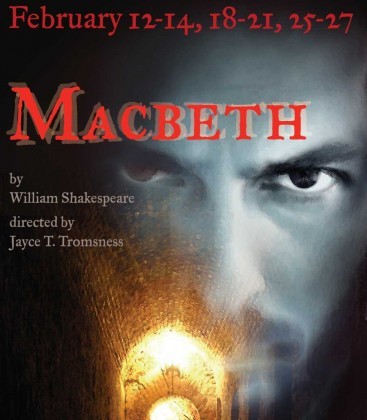February 13, 2010
The Play that Haunts Tomorrow (and Tomorrow and Tomorrow)
 I need to open this review with a brief confession: I'd like to live closer to New York. Love to live closer to New York, actually. I tell myself that just about anybody with a passion for the stage wants to be in New York, that most of us outside of New York are justifiably melodramatic (perhaps you've heard us?) in complaining about the mythical misunderstanding, oppression, and death of theatre everywhere outside of New York. Ha. After what happened at the Warehouse Theatre last night, I need to do penance for such unholy thoughts. Jayce T. Tromsness directed such a Macbeth as would make any theatre nut proud to stand up and be counted a Greenvillian.
I need to open this review with a brief confession: I'd like to live closer to New York. Love to live closer to New York, actually. I tell myself that just about anybody with a passion for the stage wants to be in New York, that most of us outside of New York are justifiably melodramatic (perhaps you've heard us?) in complaining about the mythical misunderstanding, oppression, and death of theatre everywhere outside of New York. Ha. After what happened at the Warehouse Theatre last night, I need to do penance for such unholy thoughts. Jayce T. Tromsness directed such a Macbeth as would make any theatre nut proud to stand up and be counted a Greenvillian.
There are no kilts (or robes). No grown men holding twigs in front of their faces. Not much of anything that you've come to associate with Macbeth, except the language. Tromsness sets the Scottish play in the Balkans, in the war-torn Bosnia of the 90s. Shannon Roberts comes through with an emotionally charged set--you'll be tempted to weep before the action even begins, but wait. The first ten minutes of the play are some of the most muscular and harrowing moments I've ever seen on the boards. They were in fact the most harrowing moments I'd ever seen--until we came to Macduff's pretty chickens and their dam. Yes, I cried.
With a production as stunning as this, it's hard to find highlights, so I offer instead a list of the things that are still lingering with me the morning after:
The weird sisters--Lynne Junker, Tiffany Nave, Kerrie Seymore. They don't have beards. Or matted hair. Or long bony fingers. But give them turbans and swaths of dirty lace and talismans and they'll haunt you tomorrow and tomorrow and tomorrow.
Blood. Entrails. Blood-shot eyes. Blood. I won't tell you how they do it, but the result is chilling.
Hecate. Anne Kelly Tromsness is the ultimate argument for the existence of Hecate. And her doubling as the ever-present Doctor gave a chill-bumping reminder of the strange forces at work in this world.
Ghosts! Banquo (astonishing show from Andy Croston) and his unending line of wraith-like kings.
Humans. Real humans. The Lords and Ladies Macbeth I have known in the past have already seemed to be kings before the play begins. Regal, imposing, infinitely above me and my little concerns with the world. What Paul Savas and Debra Capps bring to these roles is an unsettling familiarity. I was shocked by the every-day-ness of their language, their actions. They are more relevant than regal, which gives them an especial terror: that could be me. That could be any one of us. Don't get me wrong. When the time comes for the big explosive speeches, Savas and Capps are dynamite. But the part of their performance that is still with me today? Act Three, Scene Two--a brilliant and beautiful fight between the husband and wife.
Macduff, Macduff, Macduff! Such a stirring performance by Brock Koonce--anyone can muster a few tears for dead kids, but his show after Duncan's murder? Took my breath away--and that in a scene that has always made me cringe for false notes. I would I could usurp Shakespeare and make Macduff the next king.
How to tie up all these disparate memories? With the man who made them possible to begin with, and I don't mean Shakespeare. I've seen enough wimpy concept-driven renditions (Macbeth as a mostly-danced fable set in western Africa?) to know that the Bard alone doesn't bring this kind of muscle to a production. The director, Jayce Tromsness, has created some of the most human and horrifying Shakespeare I've experienced to date: his Macbeth is a figure from the nightly news, from Iraq or Afghanistan or any other war we've sat and watched from our armchairs. More than this: its the only Macbeth that has wrested my focus away from Otherness and War and turned a level gaze to my own sneaking ambitions. And isn't that supposed to be the point? Encore, Mr. Tromsness. Encore.
Posted by stephanie at February 13, 2010 10:37 AM | TrackBack